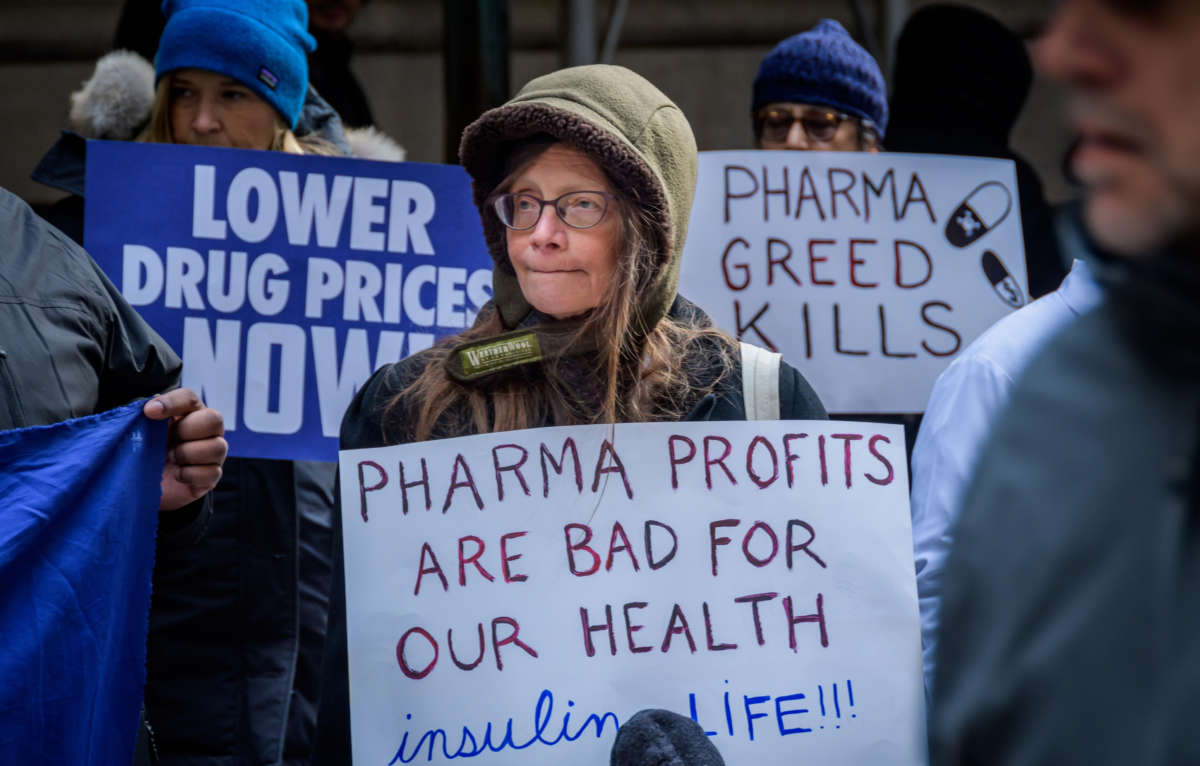Did you know that Truthout is a nonprofit and independently funded by readers like you? If you value what we do, please support our work with a donation.
The pharmaceutical industry and its allies in the Republican Party are reportedly teaming up to craft challenges to congressional Democrats’ drug price reform plan in the hopes of convincing the Senate parliamentarian — an unelected functionary — to help tank the proposal.
Earlier this month, Democrats struck a deal on a scaled-back plan that would allow Medicare to directly negotiate prices for a more limited subset of prescription medicines and penalize companies that raise drug prices more rapidly than inflation. The proposed fines for violating the inflation cap would apply to both Medicare and private plans, threatening the pharmaceutical industry’s virtually unchecked power to set prices as they please.
Though Big Pharma’s massive lobbying blitz appeared to have paid off after Democrats significantly weakened their original, broadly popular reform proposal, Politico reported that “the way the plan would extend price controls beyond Medicare… is stoking another battle over” the Build Back Better package, a centerpiece of President Joe Biden’s domestic policy agenda.
Drug industry lobbyists — who outnumber members of Congress by a ratio of three to one — are “urging Republican senators to scuttle the drug-pricing language with parliamentary challenges while looking for cracks in the Democrats’ ranks after the industry fought off more aggressive House attempts to impose drug price controls,” according to Politico.
“Backers fear both practical and political consequences if the inflation cap is stripped out — warning that drug companies could hike prices for the roughly 180 million people on employer health plans or other private insurance to make up for the revenue they stand to lose from Medicare price negotiations and other provisions of the bill,” the outlet added.
Under Senate rules, each provision of a reconciliation bill must have a direct — not “merely incidental” — impact on the federal budget, a highly subjective judgment that the unelected parliamentarian is tasked with handing down.
“This should never pass as normal: only in the dysfunctional U.S. can a single parliamentarian have more power than millions of voters to decide the economic wellbeing of the nation,” progressive activist Jonathan Tasini said Saturday.
In recent months, Elizabeth MacDonough — the current Senate parliamentarian — has deemed a proposed $15 federal minimum wage and a pathway to citizenship for millions of undocumented immigrants out of bounds for reconciliation, nonbinding opinions that Democratic lawmakers and the White House have refused to overrule.
Now Senate Republicans are hoping that, with Big Pharma’s help, they can convince MacDonough to sink the proposed inflation cap, a key component of Democrats’ plan to rein in U.S. drug prices, which are the highest in the industrialized world.
If/when Build Back Better moves to the Senate, elements of the Rx proposal — especially the inflation caps — are among those that will face parliamentary challenges. Pharma already working w GOP to craft them. Via @AliceOllstein @misswilson https://t.co/dG0Yz34p8K
— Jonathan Cohn (@CitizenCohn) November 14, 2021
Politico reported that lobbyists and Republicans are hoping the parliamentarian will see the inflation cap as “more policy-based and intended to hold down drug prices in the commercial market, regardless of how much money it saves the government.” The White House estimates the provision would save the federal government $100 billion over a decade.
Sen. Ron Wyden (D-Ore.), chair of the Senate Finance Committee and a champion of drug price reforms, told Politico that he has “insisted on” the inflation cap “applying to the commercial sector” and voiced confidence that the provision will ultimately remain in the final Build Back Better package.
“What that means is that, not just for seniors but for millions of Americans, their drug prices wouldn’t go up more than inflation unless the companies are willing to pay a penalty,” said Wyden. “I still have to go through the parliamentarian. But I think it’s going to be okay.”
The fight over Democrats’ proposed drug price reforms is heating up ahead of an expected House vote on the full reconciliation package this week. If passed, the bill will move to the Senate.
At one point last month, the drug price plan was removed from the Build Back Better proposal entirely as it faced pushback from the pharmaceutical industry and corporate-backed Democrats in the House and Senate such as Sen. Bob Menendez (D-N.J.) and Rep. Scott Peters (D-Calif.).
Thanks to the efforts of progressive lawmakers — including Sen. Bernie Sanders (I-Vt.) — and grassroots advocates, Democrats inserted a more limited but still potentially impactful drug price plan that supporters hope will serve as a starting point for more ambitious action in the future.
“It is not some radical idea to suggest that Americans should not have to die because we are the only major country that allows drug companies to raise prices to whatever they want, whenever they want,” Sanders tweeted Sunday.
“While we pay the highest prices in the world for prescription drugs and one out of four Americans can’t afford the medicine they need, the top 15 pharmaceutical executives pulled in more than $470 million in salaries and bonuses last year,” the Vermont senator wrote in a separate post. “Greed. Greed. Greed.”
Press freedom is under attack
As Trump cracks down on political speech, independent media is increasingly necessary.
Truthout produces reporting you won’t see in the mainstream: journalism from the frontlines of global conflict, interviews with grassroots movement leaders, high-quality legal analysis and more.
Our work is possible thanks to reader support. Help Truthout catalyze change and social justice — make a tax-deductible monthly or one-time donation today.
